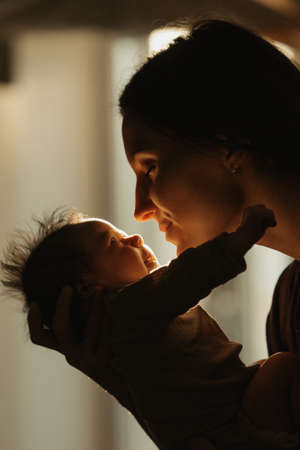Understanding SIDS: A Brief Overview
Sudden Infant Death Syndrome (SIDS), often referred to as “cot death” in the UK, is the sudden and unexplained death of a seemingly healthy baby, typically occurring during sleep. This heartbreaking event most commonly affects infants under one year old, with the highest risk between two and four months of age. Despite advances in medical research and awareness campaigns, SIDS remains a significant concern for families across the UK. Recent data from The Lullaby Trust and the Office for National Statistics highlight that while the overall rate of SIDS has declined in recent decades—thanks largely to public health initiatives such as the “Back to Sleep” campaign—approximately 200 babies still tragically lose their lives each year in England and Wales. Trends also reveal that SIDS disproportionately affects families from lower socioeconomic backgrounds, bringing attention to the importance of understanding how these factors intersect with infant health outcomes. As we explore this topic further, it’s crucial for parents, carers, and communities to stay informed about both the risks and preventative strategies associated with SIDS within the UK context.
2. What Are Socioeconomic Factors?
Socioeconomic factors are the social and economic conditions that influence an individual’s or a family’s everyday life. In the context of the UK, these factors play a significant role in shaping health outcomes, including the risk of Sudden Infant Death Syndrome (SIDS). Understanding these factors helps us appreciate how some families may face greater challenges than others, impacting their children’s wellbeing.
Key Socioeconomic Factors in the UK
| Factor | Description |
|---|---|
| Income | The amount of money a family earns. Lower income can limit access to safe housing, good nutrition, and quality healthcare, all of which can affect SIDS risk. |
| Housing Quality | The condition and stability of where a family lives. Poor housing, such as overcrowded or damp homes, increases stress and can contribute to unsafe sleeping environments for infants. |
| Employment | Whether parents or carers have stable jobs. Unemployment or insecure work often leads to financial pressure and less access to resources that support infant safety. |
| Education | The level of education achieved by parents or carers. Higher education is linked to better awareness of SIDS prevention practices, while lower education levels may mean less access to vital information. |
How These Factors Interconnect
It is important to remember that these factors do not act alone. For example, a family with low income may also live in poorer quality housing and have less access to educational resources. This combination can increase stress levels and make it harder for parents to follow recommended safe sleep guidelines for their babies.
A Real-Life Example
Imagine two families living in different parts of the UK. One has a steady income, lives in a well-maintained home, and both parents completed higher education. The other faces financial struggles, lives in temporary accommodation, and left school early. The second family is likely to face more barriers when it comes to accessing support services and understanding how best to protect their baby from SIDS.
![]()
3. Linking Socioeconomic Disparities to SIDS Risk
In the UK, socioeconomic disparities have a significant impact on the risk of Sudden Infant Death Syndrome (SIDS). A number of studies conducted across England, Scotland, Wales, and Northern Ireland have highlighted how factors such as poverty, overcrowding, and parental education play crucial roles in shaping infant health outcomes. Families living in deprived areas often face multiple challenges that can increase SIDS risk, including limited access to healthcare resources, lower rates of engagement with health visitors, and less exposure to safe sleep education campaigns.
Poverty and Material Deprivation
Poverty remains a central issue when examining SIDS risk in the UK. Research from Public Health England shows that families experiencing financial hardship are more likely to live in environments where safe sleep recommendations are harder to follow. For example, parents may be unable to afford a cot or may co-sleep due to lack of space or suitable bedding, both of which are linked with higher rates of SIDS. Limited income also restricts access to information and support services that promote safe infant care practices.
Overcrowding in the Home
Overcrowding is another critical factor identified in UK-specific studies. According to the Office for National Statistics, households in lower-income brackets frequently experience overcrowded living conditions. This often leads to shared sleeping arrangements and increases the likelihood of unintentional bed-sharing, particularly in families with multiple children or limited housing options. Overcrowding not only makes it difficult for parents to create a designated safe sleep space but can also increase stress levels within the household—both known contributors to higher SIDS risk.
The Role of Parental Education
Parental education has been consistently linked with awareness and implementation of safe sleep practices. Studies from organisations like The Lullaby Trust highlight that parents with higher levels of education are more likely to receive and act on advice about reducing SIDS risks—such as placing babies on their backs to sleep and keeping the sleep environment free from hazards. In contrast, lower educational attainment can mean reduced understanding of these guidelines or less confidence in seeking professional guidance. Addressing these educational gaps through targeted community support and culturally sensitive outreach is essential in narrowing the gap in SIDS outcomes across different socioeconomic groups in the UK.
4. Access to Healthcare and Support Services
Access to healthcare and support services is a key factor in reducing the risk of Sudden Infant Death Syndrome (SIDS) across the UK. However, socioeconomic disparities often mean that not all families benefit equally from these vital services. In some communities, barriers such as transportation difficulties, language differences, and limited awareness about available resources can prevent families from receiving timely advice and support.
Barriers to Healthcare
Families from lower socioeconomic backgrounds may face challenges in registering with a GP or accessing regular health checks for their babies. This can lead to missed opportunities for early intervention, health education, and identification of potential risks associated with SIDS.
| Barrier | Impact on SIDS Risk |
|---|---|
| Lack of transport | Missed appointments, reduced access to professional advice |
| Language difficulties | Misunderstanding safe sleep guidance |
| Poor awareness of services | No engagement with health visitors or postnatal support |
The Role of Health Visiting Services
Health visiting services in the UK play a crucial role in supporting new parents, especially during the first weeks after birth. Health visitors provide guidance on safe sleep practices, feeding, and home safety—all essential in reducing SIDS risk. However, families experiencing deprivation may be less likely to access these visits due to work commitments, housing instability, or mistrust of authorities.
Postnatal Support Variations Across Communities
Postnatal support can vary significantly depending on local authority funding and community resources. In more affluent areas, parents may have greater access to parent groups, breastfeeding support, and mental health services. In contrast, deprived areas may offer fewer options, leaving parents feeling isolated or unsupported.
Encouraging Engagement with Services
To bridge these gaps, community outreach initiatives—such as home visits by health professionals and translation services—can make a real difference. By understanding and addressing the unique needs of each family, we can help ensure every baby has the best possible start in life.
5. Cultural Attitudes and Infant Care Practices
In the UK, cultural beliefs and traditions play a significant role in shaping infant care practices, which can directly influence the risk of Sudden Infant Death Syndrome (SIDS). Family sleeping arrangements, such as co-sleeping or bed-sharing, are influenced by cultural norms and socioeconomic factors. For example, some families may choose to co-sleep due to tradition, convenience, or lack of space, but this practice has been linked to increased SIDS risk, especially when combined with other factors like parental smoking or alcohol consumption.
The diversity within the UK also means that attitudes towards safe sleep recommendations vary across communities. While public health campaigns promote placing babies on their backs to sleep and using separate cots in the same room as parents, some families may follow traditional methods from their cultural background that differ from these guidelines. Additionally, economic constraints can affect the ability to purchase appropriate bedding or cots, leading families to adapt practices that may not align with current safety advice.
Family support systems and intergenerational advice further shape infant care routines. Grandparents or older relatives may suggest sleep positions or routines based on what was common in previous generations, which may not reflect updated evidence-based recommendations. This interplay between culture, family influence, and access to resources highlights how varied infant care traditions contribute to differences in SIDS risk across UK communities.
6. Breaking the Cycle: Community Support and Resources
The United Kingdom recognises the significant role that socioeconomic factors play in increasing the risk of Sudden Infant Death Syndrome (SIDS). To break this cycle, a variety of organisations, local initiatives, and government policies have been developed to support families most at risk. Understanding these resources and how they work together is crucial for parents, carers, and communities.
National Charities Leading the Way
The Lullaby Trust stands as one of the UK’s foremost charities dedicated to raising awareness about SIDS and providing expert advice on safer sleep practices. They offer a helpline, online resources, and family support services. Tommys is another national charity focused on research and practical support for families facing pregnancy complications or loss, including SIDS risk reduction.
Local Initiatives Making a Difference
Across England, Scotland, Wales, and Northern Ireland, local councils often partner with health visitors to deliver tailored advice in communities where deprivation may heighten SIDS risk. For example, many NHS Trusts run Safer Sleep campaigns that provide free workshops and distribute safe sleep packs—including baby sleeping bags—to low-income families. In some regions, Children’s Centres host drop-in sessions for new parents to ask questions about safe sleep and infant care.
Peer Support Networks
Grassroots networks such as Mumsnet Local and NCT (National Childbirth Trust) branches provide peer-led groups where parents can share experiences, learn from each other, and access evidence-based guidance on SIDS prevention. These friendly environments help break down stigma and isolation often felt by families facing financial difficulties.
Government Policies Addressing Inequality
The UK Government’s Healthy Child Programme ensures every family receives regular health visitor check-ins during pregnancy and the early years. Health visitors are trained to identify at-risk families—often those experiencing housing instability or financial stress—and connect them with relevant support services. Additionally, the Sure Start scheme, though reduced in recent years, still operates in some areas to provide targeted support for families in deprived neighbourhoods.
A Collaborative Approach for Lasting Change
Tackling SIDS in relation to socioeconomic factors requires collaboration between healthcare professionals, local authorities, charities, and parent groups. By combining practical advice with emotional support and financial assistance where needed, these UK-based initiatives work tirelessly to ensure that every child has the best possible start in life—regardless of their background.
7. Tips for Families: Reducing SIDS Risk Together
Practical Steps for Every Household
Every UK family, regardless of background, can take simple yet effective steps to lower the risk of SIDS (Sudden Infant Death Syndrome). The key is creating a safe sleep environment and making informed choices together as a family. Here are some practical, culturally relevant tips:
1. Keep Baby’s Sleep Space Clear and Safe
Always place your baby on their back to sleep in a cot or Moses basket in the same room as you for at least the first six months. Make sure the mattress is firm and flat, with a waterproof cover. Avoid pillows, duvets, soft toys, and loose bedding, which are common risks identified in UK homes.
2. Be Mindful of Co-sleeping Practices
Co-sleeping is sometimes part of cultural traditions or necessary due to space issues. If you choose to co-sleep, ensure it’s not on a sofa or armchair, and never share a bed if you or your partner have been drinking alcohol, smoked, or taken medication that makes you drowsy.
3. Dress Your Baby Appropriately for British Weather
The UK weather can be unpredictable. To avoid overheating—a known SIDS risk—use light layers and check your baby’s chest to make sure they’re not too hot or cold. A simple vest or sleepsuit is usually enough indoors; always avoid hats while sleeping.
4. Share Bedtime Routines as a Family Activity
Encourage siblings to help prepare the sleep area by checking for loose items or helping choose safe sleepwear for the baby. This fosters responsibility and creates positive bedtime habits for everyone involved.
Family Challenge: Safe Sleep Treasure Hunt
Make safety fun by turning it into a game! Before bedtime, challenge older children to find any unsafe items in the babys cot (like toys or extra blankets) and remove them together as a team.
5. Access Local Support Networks
The NHS, health visitors, and local childrens centres offer guidance tailored to different family situations across the UK. Attend free workshops when available or join parenting groups where you can discuss safe sleep practices with other parents from similar backgrounds.
Staying Informed and Empowered
SIDS risk is influenced by socioeconomic factors such as housing conditions and access to information. By sharing knowledge within your community—whether at playgroups, church events, or local gatherings—you help others stay aware and empowered too.
Together We Can Make a Difference
No matter your family’s circumstances, small changes can have a big impact. By working together, talking openly about challenges, and supporting each other through local resources, every family in the UK can help give their babies the safest start possible.


